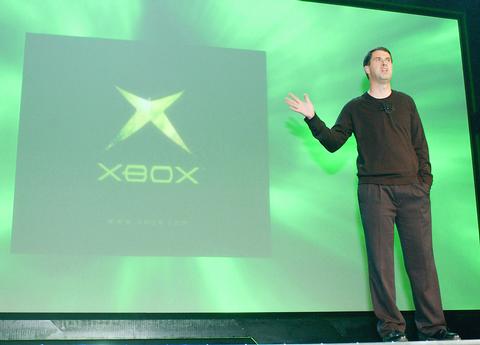Nintendo Inc became the third company to slash the price of its video-game system yesterday, and while consumers may cheer the move, it's no fun for the Taiwanese firms that manufacture the systems.
Nintendo cut the price of its GameCube console by US$50, lowering it to US$149 per unit to keep ahead of rivals Sony Corp and Microsoft Corp. Last week, the two companies lowered the prices of their PlayStation2 and Xbox, respectively, by US$100 to US$199 per console -- to match Nintendo's price at the time.

PHOTO: REUTERS
"Nintendo is committed to offering our players the best games and the best price. We were the first manufacturer to reach the US$199 price level and now we're leading the industry to US$149," Peter MacDougall, executive vice president of sales and marketing at Nintendo of America Inc, said in a statement.
In Taiwan, where a number of companies manufacture parts for the consoles, the discounts are zapping profit margins.
"The situation has become quite severe [for Taiwanese manufacturers]," said William Feng (
Feng believes companies such as Hon Hai Precision Industries Co (
Local chipmaker Macronix International Co (
Shares of Macronix plummeted NT$1.4 to end at NT$21.8 on the TAIEX yesterday.
Video-game companies are starting to sell consoles at or below cost in an effort to hook customers on their game software in a quest for long-term profits.
Major video-game makers now have plans to move their operations to the Internet, turning personal computers into the game console. Microsoft is expected to unveil a US$1 billion online system, dubbed Xbox Live, later this week, the New York Times reported yesterday. By moving the games online, the company can take advantage of multi-player games, the report said.
Sony and Nintendo also have plans to put their games online.
The silver lining for Taiwanese console makers could turn out to be sales volume. As prices plummet, more consumers will be able to afford game machines, some analysts say.
Others believe that with the economy still struggling to grow, consumers for the near-term will be less likely to spend money on video-game consoles.
Sony is expected to sell around 16.5 million PlayStation2s this year, while Nintendo should sell around 10 million GameCubes and Microsoft 8.5 million Xboxes, the UBS Warburg report said.
Hon Hai produces PlayStation2 and Wistron Inc (
GameCube is made in Japan.
A number of local manufacturers, including Delta Electronics Inc (

Intel Corp chief executive officer Lip-Bu Tan (陳立武) is expected to meet with Taiwanese suppliers next month in conjunction with the opening of the Computex Taipei trade show, supply chain sources said on Monday. The visit, the first for Tan to Taiwan since assuming his new post last month, would be aimed at enhancing Intel’s ties with suppliers in Taiwan as he attempts to help turn around the struggling US chipmaker, the sources said. Tan is to hold a banquet to celebrate Intel’s 40-year presence in Taiwan before Computex opens on May 20 and invite dozens of Taiwanese suppliers to exchange views

Application-specific integrated circuit designer Faraday Technology Corp (智原) yesterday said that although revenue this quarter would decline 30 percent from last quarter, it retained its full-year forecast of revenue growth of 100 percent. The company attributed the quarterly drop to a slowdown in customers’ production of chips using Faraday’s advanced packaging technology. The company is still confident about its revenue growth this year, given its strong “design-win” — or the projects it won to help customers design their chips, Faraday president Steve Wang (王國雍) told an online earnings conference. “The design-win this year is better than we expected. We believe we will win

Chizuko Kimura has become the first female sushi chef in the world to win a Michelin star, fulfilling a promise she made to her dying husband to continue his legacy. The 54-year-old Japanese chef regained the Michelin star her late husband, Shunei Kimura, won three years ago for their Sushi Shunei restaurant in Paris. For Shunei Kimura, the star was a dream come true. However, the joy was short-lived. He died from cancer just three months later in June 2022. He was 65. The following year, the restaurant in the heart of Montmartre lost its star rating. Chizuko Kimura insisted that the new star is still down

While China’s leaders use their economic and political might to fight US President Donald Trump’s trade war “to the end,” its army of social media soldiers are embarking on a more humorous campaign online. Trump’s tariff blitz has seen Washington and Beijing impose eye-watering duties on imports from the other, fanning a standoff between the economic superpowers that has sparked global recession fears and sent markets into a tailspin. Trump says his policy is a response to years of being “ripped off” by other countries and aims to bring manufacturing to the US, forcing companies to employ US workers. However, China’s online warriors